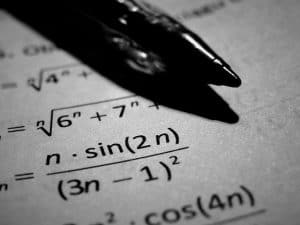Are Certain Myers-Briggs® Personality Types Smarter Than Others?
In the personality community there’s a lot of bias and superiority cluttering the message boards and forums of each type. Many people consider their type to be superior to others or assume that a preference for thinking automatically implies a preference for knowledge and intelligence. Today I want to talk about intelligence; the different kinds of intelligence that exist and which types are skilled in those different areas of intelligence. My hope is that this article will showcase some of the strengths of each type, and will also allow us to have a fuller appreciation of each type’s gifts, abilities, and talents.
Not sure what your personality type is? Take our new personality questionnaire here. Or you can take the official MBTI® here.

This post contains affiliate links. I only recommend products I truly believe in.
Table of contents
Estimated reading time: 11 minutes
What Is Intelligence?

The Merriam-Webster dictionary defines intelligence as “the ability to learn or understand or to deal with new or trying situations: also: the skilled use of reason (2) :the ability to apply knowledge to manipulate one’s environment or to think abstractly as measured by objective criteria (such as tests).”
Other words for intelligence
Shrewdness: A clever, discerning awareness and hardheaded acumen.
Acumen: The ability to make good judgments and quick decisions, typically in a particular domain.
Clever: Skillful or adroit in using the hands or body or mentally quick and resourceful.
Wit: Astuteness of perception or judgment. The ability to relate seemingly disparate things so as to illuminate or amuse.
Intellect: The capacity for rational or intelligent thought especially when highly developed.
Discernment: The quality of being able to grasp and comprehend what is obscure.
Just looking at these definitions I can see that different types would be considered more shrewd while others would be more clever and still others more intellectual. Understanding that there’s not one way to define intelligence is important.
Misconceptions About Intelligence
“The youths at the universities … could pose you entrapping questions or give baffling answers. We never set much store by them or their affected superiority, remembering that they were only at their books, while we were commanding men.”
– Winston Churchill, an ESTP
Many of us assume that an innate ability to solve complex math problems makes someone intelligent. Our performance on standardized tests is often a deciding factor in what colleges we can attend and therefore what jobs we can attain. But are standardized tests and math performances really the ultimate test of intelligence?
Let’s take a look at some influential scientists and inventors who really struggled with math.
Michael Faraday: He invented the first electric motor, along with the first electric generator. He also invented the rubber balloon, laid the groundwork for refrigeration technology, and explored electromagnetism. He is described by most biographers as being “mathematically illiterate.” His contributions to science were purely that of an experimentalist.
Alexander Graham-Bell: You know, the guy who invented the telephone? Well, he found math boring. According to biographer Robert V. Bruce, he was “bored and hence careless in working out the final answer once he learned the method.” His grades were never particularly good and his mathematical aptitude never improved even in his later years.
Thomas Edison: He’s considered America’s greatest inventor, but he always had a strong dislike for higher-level math. When as a boy Thomas Edison was forced to read Isaac Newton’s Philosophiae Naturalis Principia Mathematica (“Mathematical Principles of Natural Philosophy”) he was left with nothing but a “distaste for mathematics from which I never recovered.”
Clearly there are many different kinds of intelligence, and they can’t simply be limited to one’s ability at math or abstract reasoning.
The different types of intelligence:

In 1983 an American developmental psychologist named Howard Gardener described 9 types of intelligence. I think any of the 16 personality types can use any of these forms of intelligence. Some may come more naturally to certain types than to others, however.
Naturalist Intelligence
This form of intelligence is concerned with understanding and working with plants and living things. It is sensitive to physical features in the world around us. Botanists, farmers, ecologists, hunters can all have this form of intelligence.
Sensors may have an advantage with natural intelligence because they are more focused on the natural, concrete world around them. They like to learn through experimenting in a hands-on way with the outer world. Amassing facts is deeply appealing to them, and seeing their knowledge result in real-world impact is profoundly satisfying to them.
Musical Intelligence
This form of intelligence is skilled at discerning pitch, rhythm, tone, and timbre. It allows us to create, recreate, and reflect upon music. People with musical intelligence are sensitive listeners who notice every sound in detail. Musicians, composers, and performers often have this form of intelligence.
I can’t find any conclusive evidence that a particular type would be more advanced at musical intelligence than another.
Logical-mathematical Intelligence
The ability to calculate, quantify, consider ideas and hypotheses and carry out mathematical equations and operations. The ability to use abstract, symbolic thought, sequential reasoning skills, and inductive and deductive thinking patterns. This type of intelligence is common among mathematicians, detectives, engineers, and scientists.
While all types can be skilled at this form of intelligence, thinking types tend to show a natural gift and preference in this area based on standardized aptitude tests (MBTI® Manual – Third Edition).
Existential Intelligence
The ability to comprehend deep and meaningful questions like why we are here, the meaning of life, why we die, and how we got here. This is the type of intelligence employed by philosophers, spiritualists, and even authors and poets at times.
While all types can be skilled at this form of intelligence, intuitive types tend to show a stronger preference for this area.
Interpersonal Intelligence
The ability to understand and empathize with others. This includes verbal and nonverbal communication, the ability to quickly see changes in mood and behavior, sensitivity to emotions and temperaments, and the ability to see things from other people’s perspectives. Teachers, psychiatrists, actors, politicians, and social workers all use this kind of intelligence (some more effectively than others).
While all types can develop skill with this form of intelligence, feeling types tend to show a natural gift in this area.
Bodily-kinesthetic Intelligence
The capacity to use a variety of physical skills and/or manipulate objects in the outer world. This intelligence involves the skilled use of timing, coordination, and mind-body harmony. Athletes, dancers, surgeons, and soldiers tend to use this kind of intelligence.
While all types can develop a skill at this form of intelligence, sensing/perceiving (SP) types tend to have a natural gift for this area. Their natural attunement to the outer world as well as their talent for becoming “one” with the environment gives them a natural affinity here.
Linguistic Intelligence
The ability to use language to express and appreciate complex meanings. Understanding the order and meaning of words and applying meta-linguistic skills to reflect our use of language. Journalists, poets, authors, and public speakers all use this kind of intelligence.
According to the MBTI® Manual, sensors tend to perform better with expressive writing while intuitives perform better with reflective writing. Intuitives perform worse on reporting/journalism than sensors, but perform higher on conceptual writing. Linguistic intelligence could, therefore, be applicable to any type, but in different ways. As far as the types that enjoy writing, INFPs, INFJs, INTPs, ENFPs, ENTPs, and ENFJs were the types who listed this as a favorite leisure activity in a case study on type and leisure activities (MBTI® Manual Third Edition). Types underrepresented in enjoying writing were ESFJs, ISFPs, ISTPs, and ISTJs. This doesn’t mean they never enjoy writing or that none do, but it does mean it isn’t favored by the majority of that type in this case study.
Intra-personal Intelligence
The capacity to understand oneself, one’s thoughts, one’s emotions. The ability to study one’s emotions and motivations and use this intelligence to plan and direct one’s life. Characterized by an appreciation for the human condition. This form of intelligence is often found in spiritual leaders, psychologists, philosophers, and poets.
While all types can develop a skill at this form of intelligence, introverted feeling types (FPs) tend to have a natural gift in this area.
Spatial Intelligence
The ability to think in three dimensions. This includes being able to employ mental imagery, spatial reasoning, image manipulation, artistic skills, and bring ideas from the imagination into the real world using hands-on techniques. Sailors, soldiers, pilots, artists, and architects all tend to exhibit spatial intelligence.
I can’t find any conclusive evidence that a particular type would be better at all forms of spatial intelligence than another.
Intuition and Sensing and Intelligence
In the 1985 MBTI® Manual, Myers and McCaulley presented a comprehensive review of decades of study relating MBTI® profiles with standardized test results. According to their studies, intuitives performed better at standardized tests and SAT math scores tended to be higher for intuitive and thinking types.
This doesn’t mean that sensing and/or feeling types cannot get good SAT scores (I knew an ESTJ who got a 1530 SAT score and an ESFJ who got a 1510 score). However, statistically speaking, the NTs tend to perform better here and Myers and McCaulley explain why in the statement below:
“Sensing often operates slowly in order to be sure, and Intuition is by definition a kind of perception that involves flashes of insight, hunches, and quick perception through impressions. Neither type particularly enjoys taking standardized aptitude tests such as the SAT or the Graduate Record Exam (GRE®); Intuitive types are, however, more patient with them. They more quickly get to the gist of an abstractly worded sentence stem, record a possible answer by trusting their hunch, and move onto the next question. Sensing types also have hunches but tend not to trust them unless through practice they learn that these “guesses” can help them with timed exercises presenting a wealth of complex material.”
– The MBTI® Manual: A Guide to the Development and Use of the Myers-Briggs Type Indicator® Instrument Third Edition
Now you might look at this and think “oh, well that answers my question! Intuitives are definitely smarter than sensors!”, but let’s think about this for a moment. None of the research conclusively states that they are more intelligent, merely that they perform better on tests because they trust their hunches and get the gist of abstract wording faster. Sensors may be just as intelligent but distrust their hunches which would put them at a disadvantage when performing timed standardized tests. They may also perform better in concrete or practical skills than intuitives would (in fact they probably do). Myers and McCaulley gave this caution:
“It is important not to conclude that ES types are less intelligent than IN types. Scholastic aptitude tests measure the I and N aspects of intelligence particularly valued in academic work; they are not designed to measure the practical and applied intelligence of E and S”
– Myers and McCaulley, MBTI® Manual 1985, pp. 109-110).
“Type theory suggests that Sensing types can and will produce original ideas but usually after first consulting what they know for sure about a topic. They carefully…follow each step in sequence. Thus grounded in real data, they can then produce the kind of big picture that does not lack in detail (as so many of the initial dreams of Intuitive types do). Conversely, Intuitive types can best learn to accumulate necessary facts if their imaginations are first allowed to roam free, without impediment or excessive rules. Once inspired, Intuitive types then have psychological energy left to fill the missing pieces.”
– The MBTI® Manual: A Guide to the Development and Use of the Myers-Briggs Type Indicator® Instrument, Third Edition
Thinking and Feeling and Intelligence
Thinking types prefer a systematic approach to learning. They prefer justice and fairness in their learning environment more than they need a personal connection. They also prefer fact orientation and serialist learning.
Feeling types tend to prefer holistic learning and are more concerned with moral or care considerations.
Both thinking and feeling students can perform just as well, but they perform better if a teacher tailors their style to the student. Thinking students are more receptive when they are presented with logical arguments and reasons behind assignments. Feeling students are more receptive when they feel supported in the classroom and there is a human element to the assignment.
Both thinking and feeling types can be intelligent and scientifically-focused. The thinking/feeling factor only tells us what is more likely to motivate them in their field.
Thinking types are more motivated by impersonal pros and cons and by finding achievement and proving competence.
Feeling types are more motivated if their work will benefit or impact people in a positive way or lines up with a personal value.
“Humans aren’t as good as we should be in our capacity to empathize with feelings and thoughts of others, be they humans or animals on Earth”
– Neil de Grasse Tyson, astrophysicist, science popularizer, and a rumored ENFJ
“Be less curious about people and more curious about ideas.”
– Marie Curie, physicist, chemist, and a rumored INTP
In Conclusion…
Anyone is capable of great intelligence regardless of what personality type they have.
We can marvel at the scientific genius of Isaac Newton, an INTJ.
We can be inspired by the generosity and humanitarian work of Mother Teresa, an ISFJ.
We can be amazed by Harry Houdini, a mastermind escape artist, and an ESTP.
We can have our hearts forever impacted by the words of William Shakespeare, an INFP.
The list could go on and on…
There isn’t a “more intelligent” type. Each type has their own version of intelligence. So if you’re ever socializing in your favorite personality type community and someone decides to troll you and talk about how your type is “less superior” than theirs just remember that A) this person really must not have anything useful to do with their time. B) Your personality type has nothing to do with how intelligent or unintelligent you are.
What Are Your Thoughts?
I’d love to hear what you think! Let me and other readers know in the comments.
Find out more about your personality type in our eBook, Discovering You: Unlocking the Power of Personality Type.

Other Articles You Might Enjoy:
How You Use Your Brain Based on Your Myers-Briggs® Personality Type
The Leadership Styles of Every Myers-Briggs® Personality Type
How Each Myers-Briggs® Type Reacts to Stress (and How to Help!)












Great review. I do find, however, attributing types to historical figures (eg Shakespeare was an INFP) begs the question.
Note really. When I was studying Spanish on the Duoling Web site back when it was possible to communicate with other students, there was one other student who wrote comments which I could have said and in my style of writing. I guessed that she was also an INTP. And she was. Now she is the editor of the several books I have in the works. She is more knowledgable about the technicalities of English and she teaches ESL. What is great is that she thinks just like I do. Of vourse. My point is that an author’s personality type can be determined by their writing, what they say and how they say it.
There is a grammar error.
“We can be amazed by Harry Houdini, a mastermind escape artist and an ESTP.”
There should be no “and” in the sentence.
You are mistaken. Houdini was an escape artist, AND he was an ESTP (reportedly). The sentence is correct; you are not.
Your examples of those who hated math but were intelligent demonstrates nothing. One would have to know about their academic experiences to make specific judgements. In any case, such high creativity is invariably limited to those with high IQ. Usually the top 10%. Also, IQ scores are the most objective tests ever created by psychology. Of course, there are various forms of intelligence, but there is no replacement for raw intelligence. It is, in fact, the single greatest predictor of success in such imporatant areas of life as education and income.
IQ – within an individual doesn’t change, yes?
This is what the scientific and psychological standards quote.
I scored a 72 on an IQ test in the fourth grade. I’m sure you’re curious why a third party was adminstering such a test to a child, yes?
In short – I was basically kicked out of elementary ?. For being emotionally, cognitively, and physically uncapable of learning.
Below I have provided you with a question, similar to those in an IQ TEST.
Are you up for the challenge? Only if you’re Invariably curious though.
A decade, plus a few, multipled by Tesla’s ideology of the secret number – that is referred to as the number of enlightenment. Take this answer and subtract it by 80. You’re answer should be 28. Which is my current age.
If you’ve read this far, I’d like you to fathom this.
How in the fuck does raw intelligence CREATE an IQ test??? I do appologize in thereof. I personally took offense to your comment, not only for myself, but also for all humans.
Ohh an this is a superlative example – as in accordance to your focal in IQ basically meaning ones ability to find and or create success? Is further being edified by an idiosyncratic who’s IQ is a mere 72.
I mainly chose to comment on this for the readers, not to single you out.
Please understand that.
I recommend Goldman’s book on Emotional Intelligence.
Sincerely,
The enigma of the 16, the INFJ.
I = 60%
Ni = 100%
F = 87%
J = 60%
Feel free to find me on Instagram @JenigmaB
Again, I apologize.
Only in the current economic setup and value system. This type of “raw intelligence” is what is valued and sought after. It does not mean that it’s the only valuable asset.
The STP are polyvalent, they are the descendants of hunter-gatherers, with practical intuition, a concrete and rational planning (Chart the Corse) an ability to use simultaneously N and S. Their Fe to lead a group and avoid conflicts in a hostil nature. Strong survival instinct.
The NT are recent, they appear during the Antique Period, they are able to intense and lasting concentration, they are necessary to the elaboration of civilization. They are scientific, architects, philosophers. Brilliant mind.
STJ are just the result of NT need to control the STP. That’s why they are numerous. (Yes nothing more)
SFP are contemporary of NT and STJ, they are the distraction of the plebs, sometimes the king’s buffoons. Today we say Artist. They are very important for STP who bear the STJ all the day. Creative mind.
NF are a hope. For everybody. Generally they come from sky. And sometimes they are not understood by the other types. Their life can be short, but they enjoyed to a post mortem renown. Transcendent people.
THIS WAS GREAT!!!!!! I am very glad you wrote it and went into such depth and detail! I will actually be using some of the information tonight on me and Heidi’s live stream and I have added it to the description in my Intuitive Superiority video!
Keep it up! 🙂
Thanks Deezy! I’m so glad you enjoyed it 🙂 I’m actually about to watch your live stream (wanted to last night, but my kids had other ideas) 🙂
why don`t we just look at the facts?
http://psych.wisc.edu/henriques/papers/Sak.pdf
Another important factor is mistyping! I keep hearing gifted “introverts” talk about how outgoing and social and friendly and bold they were as children until adults and/or peers beat it out of them and they “learned” to find comfort in solitude. That is not an introvert. It’s a damaged extrovert. Real introverts don’t have to learn to be comfortable alone only once people fail to accept who they really are.
Also, most of the sources saying that introversion is more common in the gifted population take their samples from the clients of psychologists specializing in gifted kids, camps for gifted kids, etc. I wouldn’t have been caught dead near either of those! Sadly, no researchers ever came to the eye doctor or any of the million camps I attended at the rec center and asked me for my IQ and personality type.
Thank you, Susan, for this article. It’s a confidence boost for me.
Infps may be the best in musical intelligence because they are better than other types at listening according to dario nardi’s brain scans of the mbti types.
I think STs are best at spatial reasoning. S types are good at visualizing things from the real world. Isfp is supposed to use the visual regions of the brain more than other mbti types (again according to dario narid’s brain scans). They tend to be artists. T types tend to be good at maneuvering objects around physically (parallel parking) and mentally (like with the spatial part of IQ tests).
S types are probably better at memorizing facts, while N types can think of the big picture and make better choices because of that, as long as they don’t ignore reality. J types will persist at difficult work better than P types who tend to give up easily when it gets hard or boring. P types have higher drop out rates, but they experiment, and that can sometimes result in great inventions. I types will tend to do better in academics than E types because schoolwork requires sitting down and doing work alone. E types will do better in P.E. than I types because E types tend to be more outgoing, active, and team-oriented.
Although iq tests only measure certain parts of intelligence, it often happens that the kind of intelligence iq tests for correlates to intelligence in other areas too. Ability to learn/memorize and reason are good predictors of intelligence in other areas. if you can’t remember/learn well, then you aren’t likely to do well remembering anything about music or nature or math or language or social norms. The reason Intelligent people fail to do well in a certain subject is often because they just don’t have interest in that area. My kid has a great memory for remembering things she cares about like dinosaurs, pokemon, & animal breeds, but she quickly forgets spanish, grammar, or piano because she isn’t interested in them.
I’m rather surprised by the amount of negative comments to this insightful article. I personally found it both enlightening and encouraging. Thank you Susan!